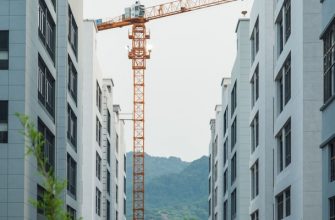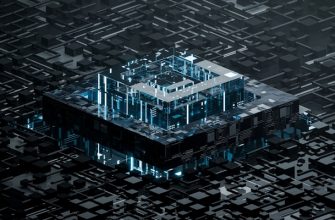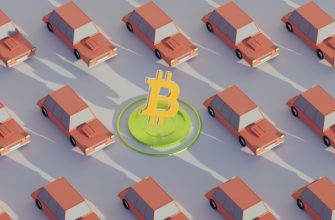- Understanding the Convergence of Real World Assets and Digital Innovation
- How Blockchain is Reshaping Property Ownership and Management
- Navigating Regulatory Challenges in the Digital Asset Landscape
- The Role of Smart Contracts in Real Estate Transactions
- Future Trends: Tokenization and Its Impact on Property Liquidity
- Case Studies: Successful Integrations of RWA in Property Tech
Understanding the Convergence of Real World Assets and Digital Innovation
The convergence of real-world assets (RWA) and digital innovation is reshaping the landscape of property technology. As the lines blur between tangible assets and their digital counterparts, a new era of investment and ownership is emerging. This integration enhances accessibility, liquidity, and transparency in property transactions, making it easier for investors and consumers alike to engage with real estate markets.
Real-world assets, such as real estate, art, and commodities, are increasingly being tokenized on blockchain platforms. This tokenization process allows for fractional ownership, enabling a broader audience to invest in high-value assets that were previously out of reach. Digital assets, including cryptocurrencies and non-fungible tokens (NFTs), are also playing a significant role in this transformation, providing innovative solutions for asset management and transfer.
- Enhanced Liquidity: Tokenization of RWAs allows for quicker transactions, facilitating a more dynamic marketplace.
- Increased Accessibility: With digital platforms, investors can easily access a diverse range of RWAs regardless of geographical barriers.
- Improved Transparency: Blockchain technology offers immutable records, ensuring transparency in ownership and transaction history.
- Fractional Ownership: Investors can own a fraction of high-value assets, lowering the entry barrier for participation in property markets.
The future of property technology lies in embracing the synergies between RWAs and digital assets. By leveraging advanced technologies, stakeholders can create more efficient processes, reduce operational costs, and enhance user experiences in real estate transactions. As this trend continues to evolve, the potential for innovation within the property sector is limitless, paving the way for a more integrated and accessible investment landscape.
How Blockchain is Reshaping Property Ownership and Management
Blockchain technology is revolutionizing the landscape of property ownership and management by introducing transparency, security, and efficiency. This decentralized ledger system allows for the seamless recording and transfer of real estate assets, fundamentally altering traditional processes. With blockchain, property transactions can be executed with reduced friction and minimized costs, eliminating the need for intermediaries.
- Decentralization: Ownership records stored on a blockchain are not held by a single entity, reducing the risk of fraud and enhancing trust among stakeholders.
- Smart Contracts: These self-executing contracts automate various aspects of property transactions, ensuring that terms are met without the need for manual oversight.
- Improved Liquidity: Tokenization of real estate assets allows for fractional ownership, making it easier for investors to buy and sell shares in properties.
- Enhanced Transparency: All transactions on a blockchain are publicly accessible, providing a clear audit trail that can be verified by all parties involved.
The impact of blockchain on property management is equally significant. By leveraging this technology, property managers can streamline operations, from tenant screening to lease management. The integration of blockchain can lead to improved tenant experiences through automated processes and timely communication.
Furthermore, the collaboration of real-world assets (RWA) with digital assets is paving the way for innovative property technology solutions. As digital assets gain traction, the ability to represent physical properties as tokenized assets enhances accessibility for a broader range of investors. This synergy between RWA and digital assets not only democratizes real estate investment but also fosters a more inclusive market.
In conclusion, the transformative power of blockchain in property ownership and management is undeniable. As the technology continues to evolve, its integration with real estate will redefine investment strategies, enhance operational efficiencies, and create new opportunities for stakeholders across the industry.
Navigating Regulatory Challenges in the Digital Asset Landscape
The digital asset landscape presents a myriad of regulatory challenges that stakeholders must navigate to ensure compliance and innovation. As the interplay of Real World Assets (RWA) and digital assets evolves, understanding these regulatory frameworks becomes essential for businesses operating within this space. The integration of RWAs and digital assets is not merely a trend but a transformation that necessitates a thorough grasp of the legal implications.
- Regulatory Compliance: Adhering to local and international regulations is crucial for the legitimacy of digital asset offerings. Continuous monitoring of legal changes ensures that businesses remain compliant.
- Consumer Protection: Safeguarding user interests is paramount. Regulatory frameworks often mandate transparency and fairness in transactions involving digital assets and RWAs.
- Tax Considerations: The taxation of digital assets can vary significantly across jurisdictions. Understanding the tax obligations associated with RWAs in digital formats is vital for accurate financial planning.
- Data Privacy: As digital assets often involve the collection and processing of personal data, compliance with data protection laws is necessary to avoid penalties and build consumer trust.
- Licensing and Registration: Many jurisdictions require specific licenses for businesses dealing with digital assets. Identifying the necessary registrations is crucial for lawful operation.
In this complex regulatory environment, collaboration with legal experts can provide invaluable insights into best practices for integrating RWAs with digital assets. Furthermore, staying informed about ongoing regulatory developments will empower businesses to adapt swiftly to changes, ensuring long-term sustainability in the property technology sector.
Ultimately, the future of property technology hinges on a balanced approach that harmonizes innovation with regulatory compliance. As the digital asset landscape continues to mature, proactive engagement with regulatory challenges will define the success of enterprises in leveraging the potential of RWAs.
The Role of Smart Contracts in Real Estate Transactions
Smart contracts play a pivotal role in the evolving landscape of real estate transactions, particularly within the context of the interplay between real-world assets (RWA) and digital assets. These self-executing contracts, which are coded on blockchain technology, enable seamless and transparent property transactions. By automating the execution of agreements, smart contracts minimize the need for intermediaries, reducing both time and costs associated with real estate dealings.
One of the primary advantages of utilizing smart contracts in real estate is enhanced security. Each transaction is recorded on a decentralized ledger, ensuring that all parties have access to the same information, thereby reducing the risk of fraud. Additionally, the immutable nature of blockchain technology guarantees that once a property transaction is recorded, it cannot be altered or disputed, providing a reliable history of ownership.
Moreover, smart contracts facilitate faster transactions. Traditional property transactions often involve lengthy processes, including title searches and paperwork. With smart contracts, these processes can be streamlined through automation, allowing for quicker transfers of ownership and reducing the waiting period for buyers and sellers.
- Transparency: All parties involved in the transaction have access to the same information, ensuring clarity and trust.
- Cost-effectiveness: Reduces the need for intermediaries, leading to lower transaction fees.
- Efficiency: Automates various steps in the transaction process, speeding up the overall process.
- Security: Provides a secure method of conducting transactions with reduced risk of fraud.
As the integration of RWAs with digital assets continues to grow, the significance of smart contracts in real estate cannot be overstated. They not only enhance the efficiency and security of property transactions but also pave the way for innovative solutions in property technology. This evolution marks a transformative shift in how real estate deals are conducted, ensuring that the future of property transactions will be more streamlined, transparent, and secure.
Future Trends: Tokenization and Its Impact on Property Liquidity
Tokenization has emerged as a pivotal innovation in the realm of real-world assets (RWA), significantly enhancing the liquidity of properties. This process converts physical assets into digital tokens, enabling fractional ownership and facilitating easier transactions. As property technology evolves, the integration of tokenization is reshaping how investors and consumers interact with real estate.
One of the key advantages of tokenization is the increased accessibility it offers to a broader audience. By breaking down high-value properties into smaller, tradable units, tokenization allows more individuals to invest in real estate, democratizing access to property investments. This shift not only attracts new investors but also invigorates the entire real estate market.
- Enhanced Liquidity: Traditional real estate transactions can be time-consuming and costly. Tokenization streamlines this process, enabling quicker sales and purchases.
- Global Reach: Digital tokens can be traded across borders, inviting international investors and expanding the market for property assets.
- Reduced Barriers: With lower minimum investment thresholds, tokenization fosters a more inclusive investment landscape, allowing a diverse range of participants to engage in property ownership.
- Transparency: Blockchain technology, which underpins tokenization, ensures that all transactions are recorded and immutable, thereby enhancing trust among investors.
- Fractional Ownership: Tokenization enables shared ownership models, making it feasible for investors to diversify their portfolios across multiple properties without significant capital outlay.
The implications of tokenization on property liquidity are profound. As more assets undergo this digital transformation, the traditional property market is likely to witness a paradigm shift. Investors can expect greater flexibility, higher returns, and an overall more dynamic real estate environment. As the intersection of RWA and digital assets continues to evolve, the future of property technology looks promising, with tokenization at its core.
Case Studies: Successful Integrations of RWA in Property Tech
The integration of Real World Assets (RWA) in Property Technology has emerged as a revolutionary approach, bridging the gap between physical assets and digital innovations. Several case studies illustrate the successful implementation of RWA in the property sector, showcasing how digital assets can enhance traditional real estate investments.
- Case Study 1: Tokenized Real Estate Platforms – A leading real estate firm launched a tokenization platform that allowed fractional ownership of commercial properties. This integration of RWA and digital assets facilitated greater liquidity and democratized access to high-value investments.
- Case Study 2: Smart Contracts in Leasing – A property management company adopted smart contracts to streamline leasing agreements. By utilizing RWA alongside blockchain technology, the process became more transparent and efficient, reducing administrative costs and enhancing tenant satisfaction.
- Case Study 3: Crowdfunding for Development Projects – A real estate crowdfunding platform successfully integrated RWA to attract investors for development projects. This innovative approach allowed investors to support projects using digital tokens, thus connecting them directly with tangible assets.
These examples underscore the potential of RWA in reshaping the landscape of Property Technology. The synergy between digital assets and traditional real estate opens new avenues for investment, enabling a more inclusive and efficient market. As the trend continues, the successful integration of RWA will likely serve as a blueprint for future advancements in the property sector.









